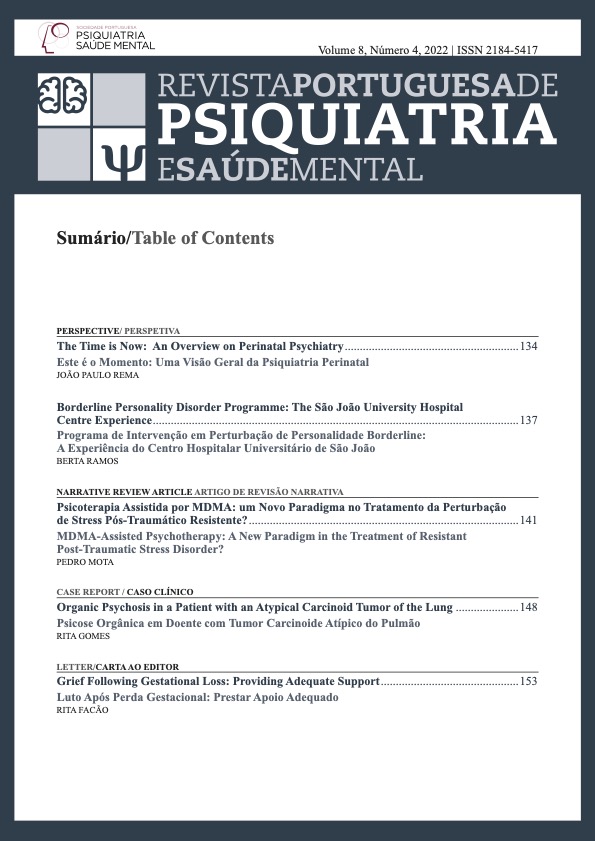Psicoterapia Assistida por MDMA: um Novo Paradigma no Tratamento da Perturbação de Stress Pós‐Traumático Resistente?
DOI:
https://doi.org/10.51338/rppsm.327Palavras-chave:
Alucinogénios, N‐Metil‐3,4‐Metilenodioxianfetamina, Perturbação de Stress Pós‐Traumático, PsicoterapiaResumo
A perturbação de stress pós‐traumático (PSPT) é uma doença psiquiátrica comum, geralmente crónica, com severas implicações na qualidade de vida da pessoa afetada e da sua família, e que tem vindo a apresentar um crescente reconhecimento enquanto problema de Saúde Pública. Nas últimas duas décadas, estudos clínicos com 3,4‐metilenodioximetanfetamina (MDMA) têm vindo a demonstrar o seu papel promissor enquanto potencializador psicoterapêutico em doentes com PSPT, tendo a psicoterapia assistida por MDMA inclusivamente recebido em 2017 a designação de breakthrough therapy.
Estes estudos têm vindo a ser replicados em vários locais do mundo, segundo estritos protocolos, estando atualmente a
sua aprovação para uso clínico prevista para 2023. Em maio de 2021, foram publicados os primeiros resultados de estudos de fase III, nos quais os participantes que receberam psicoterapia assistida por MDMA experienciaram uma redução significativa e duradoura nos sintomas de PSPT. Os efeitos pró‐sociais e interpessoais agudos do MDMA têm demonstrado melhorar significativamente a qualidade da aliança terapêutica, potenciando a adesão ao tratamento da PSPT e o seu outcome. Os clínicos sugerem que o MDMA pode catalisar o processamento terapêutico, permitindo que os pacientes permaneçam emocionalmente envolvidos enquanto revisitam experiências traumáticas sem se tornarem oprimidos.
Tendo em conta a prevalência da PSPT e as limitações encontradas com os tratamentos atualmente disponíveis, foi realizada uma revisão narrativa da literatura com o objetivo de examinar a utilização da psicoterapia assistida por MDMA na perturbação de stress pós‐traumático, apresentando uma contextualização histórica desta molécula, os seus potenciais efeitos nos diferentes sintomas desta patologia e identificando áreas prioritárias para intervenção e investigações futuras.
Downloads
Referências
Morina N, Wicherts JM, Lobbrecht J, Priebe S. Remission from post-traumatic stress disorder in adults: a systematic review and meta-analysis of long term outcome studies. Clinical psychology review. 2014;34(3):249-55.
Shiner B, D’Avolio LW, Nguyen TM, Zayed MH, Young-Xu Y, Desai RA, et al. Measuring use of evidence based psychotherapy for posttraumatic stress disorder. Administration and Policy in Mental Health and Mental Health Services Research. 2013;40(4):311-8.
Steenkamp MM, Litz BT, Hoge CW, Marmar CR. Psychotherapy for military-related PTSD: A review of randomized clinical trials. Jama. 2015;314(5):489-500.
Erbes CR, Curry KT, Leskela J. Treatment presentation and adherence of Iraq/Afghanistan era veterans in outpatient care for posttraumatic stress disorder. Psychological Services. 2009;6(3):175.
Fortney JC, Pyne JM, Edlund MJ, Stecker T, Mittal D, Robinson DE, et al. Reasons for antidepressant nonadherence among veterans treated in primary care clinics. The Journal of clinical psychiatry. 2010;71(6):16967.
Feduccia AA, Jerome L, Klosinski B, Emerson A, Mithoefer MC, Doblin R. Breakthrough for trauma treatment: safety and efficacy of MDMA-assisted psychotherapy compared to paroxetine and sertraline. Frontiers in psychiatry. 2019;10:650.
Mitchell JM, Bogenschutz M, Lilienstein A, Harrison C, Kleiman S, Parker-Guilbert K, et al. MDMA-assisted therapy for severe PTSD: a randomized, double-blind, placebo-controlled phase 3 study. Nature Medicine. 2021;27(6):1025-33.
Bernschneider-Reif S, Öxler F, Freudenmann R. The origin of MDMA (‘ecstasy’)–separating the facts from the myth. Die Pharmazie-An International Journal of Pharmaceutical Sciences. 2006;61(11):966-72.
Doblin R, Greer G, Holland J, Jerome L, Mithoefer MC, Sessa B. A reconsideration and response to Parrott AC (2013)“Human psychobiology of MDMA or ‘Ecstasy’: an overview of 25 years of empirical research”. Human Psychopharmacology: Clinical and Experimental. 2014;29(2):105-8.
Sessa B, Higbed L, Nutt D. A review of 3, 4-methylenedioxymethamphetamine (MDMA)-assisted psychotherapy. Frontiers in psychiatry. 2019;10:138.
Mithoefer MC, Wagner MT, Mithoefer AT, Jerome L, Doblin R. The safety and efficacy of±3, 4-methylenedioxymethamphetamine-assisted psychotherapy in subjects with chronic, treatment-resistant posttraumatic stress disorder: the first randomized controlled pilot study. Journal of psychopharmacology. 2011;25(4):439-52.
Dunlap LE, Andrews AM, Olson DE. Dark classics in chemical neuroscience: 3, 4-methylenedioxymethamphetamine. ACS chemical neuroscience. 2018;9(10):2408-27.
Liechti ME, Saur MR, Gamma A, Hell D, Vollenweider FX. Psychological and physiological effects of MDMA (“Ecstasy”) after pretreatment with the 5-HT2 antagonist ketanserin in healthy humans. Neuropsychopharmacology. 2000;23(4):396-404.
Baggott MJ, Coyle JR, Siegrist JD, Garrison KJ, Galloway GP, Mendelson JE. Effects of 3, 4-methylenedioxymethamphetamine on socioemotional feelings, authenticity, and autobiographical disclosure in healthy volunteers in a controlled setting. Journal of psychopharmacology. 2016;30(4):378-87.
Bedi G, Hyman D, de Wit H. Is ecstasy an “empathogen”? Effects of±3, 4-methylenedioxymethamphetamine on prosocial feelings and identification of emotional states in others. Biological psychiatry. 2010;68(12):1134-40.
Pentney AR. An exploration of the history and controversies surrounding MDMA and MDA. Journal of psychoactive drugs. 2001;33(3):213-21.
Greer GR, Tolbert R. The therapeutic use of MDMA. Ecstasy: The clinical, pharmacological and neurotoxicological effects of the drug MDMA: Springer; 1990. p. 21-35.
Doblin R. A clinical plan for MDMA (Ecstasy) in the treatment of posttraumatic stress disorder (PTSD): partnering with the FDA. Journal of psychoactive drugs. 2002;34(2):185-94.
Tedesco S, Gajaram G, Chida S, Ahmad A, Pentak M, Kelada M, et al. The Efficacy of MDMA (3, 4-Methylenedioxymethamphetamine) for Post-traumatic Stress Disorder in Humans: A Systematic Review and Meta-Analysis. Cureus. 2021;13(5).
Feduccia AA, Mithoefer MC. MDMA-assisted psychotherapy for PTSD: are memory reconsolidation and fear extinction underlying mechanisms? Progress in neuro-psychopharmacology and biological psychiatry. 2018;84:221-8.
Ferrajão PC. Pathways between combat stress and physical health among Portuguese war veterans. Qualitative health research. 2017;27(11):1640-51.








